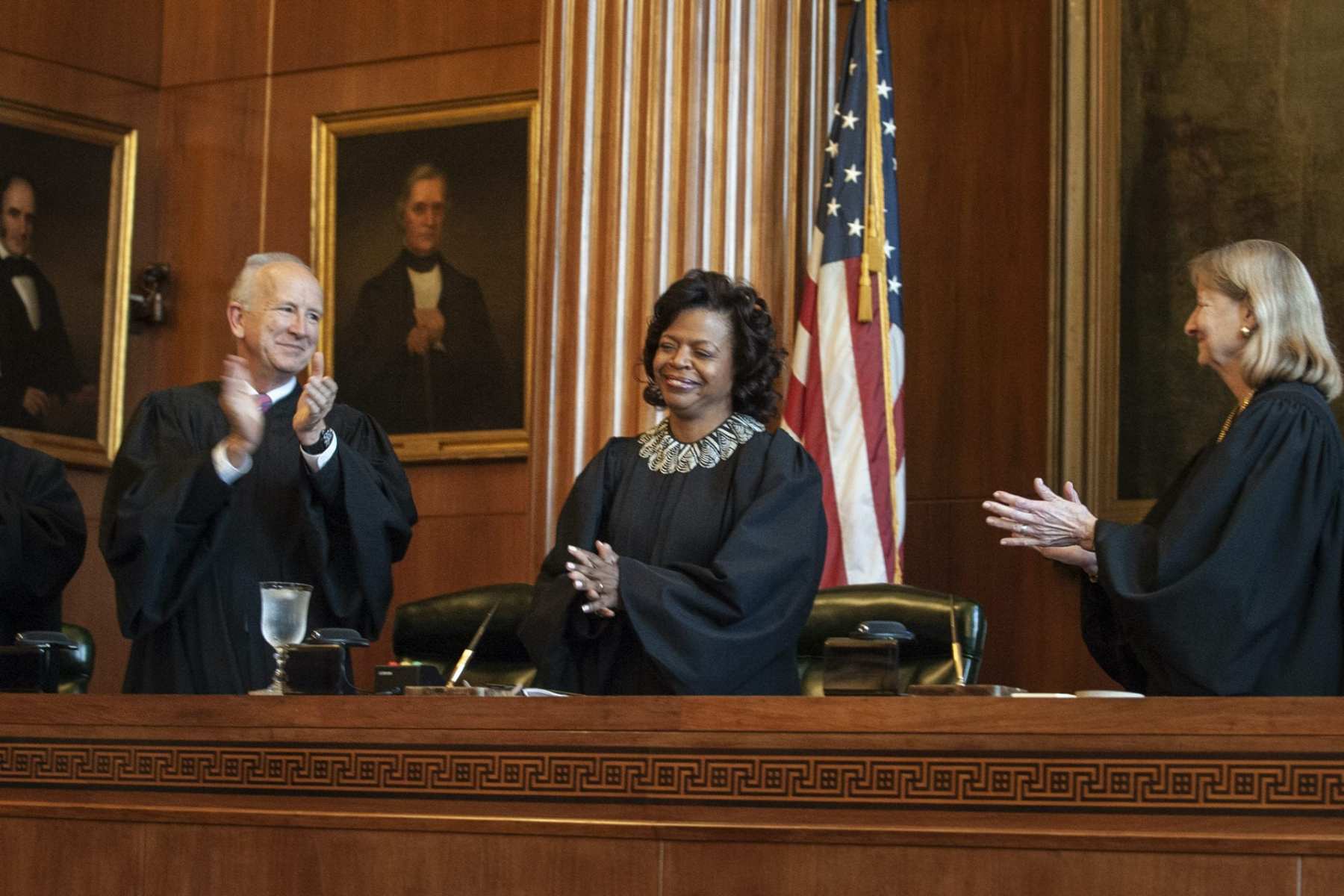Editor’s note: Ruth Bader Ginsburg’s death on September 18, 2020, renewed attention on who President Donald Trump and Democratic presidential nominee Joe Biden might pick to fill a Supreme Court vacancy. Even before Ginsburg’s death, progressive judicial advocacy groups, like Demand Justice, were readying a list of suggested women for Biden’s shortlist.
Progressive Democrats are aiming to amplify Democratic presidential candidate Joe Biden’s pledge to nominate a Black woman to the U.S. Supreme Court by launching a new campaign that highlights 17 potential picks from the lower courts, advocacy organizations and academia.
Demand Justice, a group that formed in the wake of the 2016 election, when now President Donald Trump excited Republican voters by promising to nominate conservative judges and justices, on Wednesday added 11 Black women to its Supreme Court shortlist.
The progressive group is also launching a “She Will Rise” campaign — the name a nod to the poetry of Maya Angelou — that it hopes will mobilize Democratic voters in the final weeks of the 2020 campaign.
In June 2016, 70 percent of Trump’s supporters said that Supreme Court appointments were a “very important” factor in their decision while 62 percent of those who planned to vote for Democrat Hillary Clinton said the same, according to the Pew Research Center. The same survey conducted in August 2020 showed that voters had flipped, with 66 percent of Biden’s supporters naming Supreme Court picks as “very important” versus 61 percent of Trump’s backers.
Democratic voters are headed into the November election with 87-year-old Justice Ruth Bader Ginsburg — the court’s most senior liberal — battling late-stage pancreatic cancer.
Ginsburg has said she will not retire from her lifetime appointment to the nine-member court in a move to deny Trump the opportunity to fill another vacancy. But the likelihood she will depart sometime during the next president’s term is creating a political dynamic similar to the 2016 election, when Justice Antonin Scalia, a conservative icon, died in February, creating a high-court vacancy as the presidential primaries were in full swing.
President Barack Obama quickly nominated federal appeals court judge Merrick Garland to fill Scalia’s seat but Senate Majority Leader Mitch McConnell, a Republican, blocked the chamber from voting on him.
McConnell said then that the next president, not Obama, should fill the vacancy, arguing that when George H.W. Bush was president, Democrats, led by Biden, who then chaired the Senate Judiciary Committee, had floated the idea that any imminent vacancy should not be filled until after the 1992 presidential election. (No vacancy occurred.) Nevertheless, McConnell cited the “Biden rule” when he blocked Garland’s confirmation vote, thrusting the issue front-and-center on the 2016 campaign trail.
As Trump got closer to securing the Republican 2016 president nomination, he released a list of potential Supreme Court picks to fill Scalia’s vacancy as a way to prove his conservative bona fides as an untraditional candidate. Focusing on the courts was an effective strategy: of the 21 percent of voters who cited Supreme Court appointments as the most important factor in their decision, 56 percent backed Trump, according to CNN exit polling.
During his first term, Trump, with McConnell’s assistance, has delivered on his promise to nominate conservative jurists to the country’s courts. Supreme Court Justices Neil Gorsuch and Brett Kavanaugh have been installed during Trump’s presidency as have more than 200 federal judges. Trump reiterated last week that “apart from matters of war and peace, the nomination of a Supreme Court justice is the most important decision an American President can make.”
Trump has now appointed more federal appeals court judges than any other president; his appointees now make up more than a quarter of all active federal judges overall; and, though he has appointed more women jurists than his Republican predecessors, Trump’s picks still skew White and male, according to Pew Research Center analysis of government data.
Demand Justice’s “She Will Rise” initiative, officially launching with an event on Monday, will highlight that “the White male experience has defined the moral compass that undergirds our laws and policies.”
“Appointing a Black woman to the Supreme Court is the next and necessary step towards a truer form of democracy and ensuring that our unique experiences and perspectives are represented,” said Kimberly Tignor, a Demand Justice adviser and member of the cohort of Black women behind the “She Will Rise” campaign.
New members of the cohort include authors Glory Edim, Minda Hart, Donna Hylton and Morgan Jenkins; actresses Tiffany Boone and Audra McDonald and Brittany Packnett, a former member of Obama’s policing task force and the Ferguson Commission.
The Black women newly added to Demand Justice’s Supreme Court shortlist are North Carolina Supreme Court Justice Cheri Beasley; Rutgers University law professor Elise Boddie; Kristen Clarke with the Lawyers’ Committee for Civil Rights Under Law; Fatima Goss Graves with the National Women’s Law Center; U.S. District Court for the District of Columbia Judge Ketanji Brown Jackson; Oregon Supreme Court Associate Justice Adrienne Nelson; NAACP Legal Defense and Educational Fund Associate Director-Counsel Janai Nelson; L. Song Richardson, a law professor at the University of California, Irvine; Innocence Project Executive Director Christina Swarns; G. Helen Whitener, an associate justice on Washington’s Supreme Court; and U.S. District Court for the District of Minnesota Judge Wilhelmina Wright.
Demand Justice’s previous Supreme Court shortlist included former public defenders, academics and plaintiffs lawyers, with some Black women among them. They started keeping the list before Biden secured the presidential nomination in order to “prod” Democratic candidates into considering progressive court picks.






